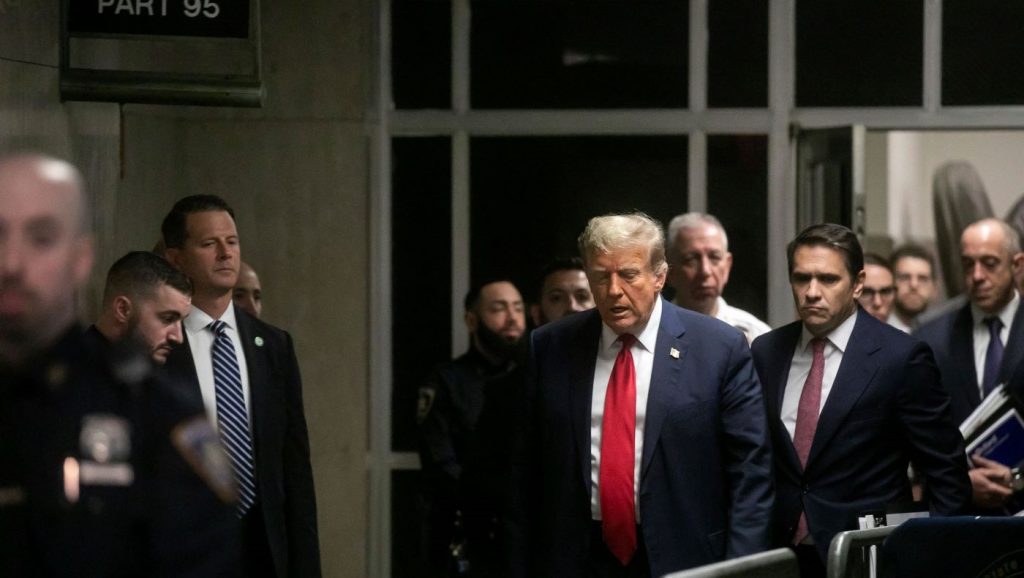Former President Trump’s initial criminal trial began seriously on Monday, with the start of arguments from both sides, as well as the first witness being called.
Trump is accused of 34 serious charges of altering business records.
The alleged crimes focus on a $130,000 payment made to adult film actress Stormy Daniels in the final days of the 2016 election campaign. The money was meant to prevent Daniels from publicizing a supposed sexual encounter with Trump a decade earlier.
Trump denies any such encounter and denies any legal misconduct.
The trial, in Lower Manhattan, is the first criminal trial of a former president.
If found guilty, Trump could face up to four years in jail, although this would be uncommon for a first-time offender.
Here are the main points from Monday.
Prosecution argues that Trump was plotting to influence the election
The offenses Trump is accused of are usually minor crimes — unless prosecutors can show they were committed in service of another crime.
This has always been a point of contention in the New York case because — despite being indicted in three other unrelated cases — Trump has not been charged with any other crime related to the payment to Daniels.
Monday’s proceedings made it clearer than ever that prosecutors are arguing Trump was plotting to affect the 2016 election, however.
Prosecutor Matthew Colangelo called Trump’s actions “election fraud, pure and simple.”
Colangelo added that Trump and his associates were part of “a criminal scheme to corrupt the 2016 presidential election.”
The prosecution’s argument includes the tumult that followed the public release of the Access Hollywood tape in early October 2016. On the tape, which dated from 2005, Trump was heard boastfully talking about women, and he stated that fame allowed any “star” to grab women by the genitals.
Prosecutors argue that Trump knew his campaign was unlikely to survive further embarrassing stories, which meant it was crucial to bury Daniels’s accusation.
“Another story about sexual infidelity, especially with a porn star, on the heels of the Access Hollywood tape, would have been devastating to his campaign,” Colangelo said.
Much will depend on whether the prosecution can prove this part of their case.
The Trump defense: Not a big deal
Trump’s team tried to counter the prosecution with a simple argument: What's the problem?
“There’s nothing wrong with attempting to influence an election — it’s called democracy,” said Todd Blanche, the former president’s main lawyer.
The defense also tried to ridicule the idea that someone as frugal as Trump would try to hide a $130,000 payment to Daniels, made through his former lawyer and fixer Michael Cohen, by paying $420,000 in installments to Cohen.
The Trump team’s argument is that the payments were not meant to conceal a sinister plot, but were legitimate legal fees.
Cohen is expected to testify against Trump, but the former president’s legal team tried to portray the once-friend as a scoundrel driven by animosity toward the former president.
Cohen previously admitted to committing crimes involving tax fraud, election finance law, and lying to Congress. This allowed Trump’s team to dismiss him as a “criminal” and ignore his evidence.
Blanche told the jury that the prosecution was essentially trying to create a criminal case from harmless events.
He insisted that if the jurors used their “common sense,” the result would be a quick ‘not guilty’ verdict.
Trump may be in danger if he decides to testify
One of the major questions hanging over the trial is whether Trump will testify in his own defense.
Judge Juan Merchan, who has been frequently criticized by Trump in speeches and on social media, made a decision on Monday that increases the risks for the former president.
Merchan had to determine the subjects prosecutors could discuss with Trump if he does testify.
The judge allowed the prosecution significant freedom.
He ruled that they could inquire about the substantial civil fraud case in which Trump and his business were fined $454 million.
The judge also approved questions about the two defamation cases filed against Trump by writer E. Jean Carroll, who claims Trump sexually assaulted her in a New York department store in the 1990s. Additionally, the judge permitted discussion of Trump's potential violation of a gag order in another, separate civil case.
An apparent Trump violation of a gag order in another, separate civil case can also be discussed.
Trump might still choose to testify. This would be in line with his strong belief in himself.
But Merchan’s order is likely to give Trump’s legal team some pause.
The trial is moving quickly
Early estimates that Trump’s trial could last six weeks or longer could be proven wrong if Merchan keeps things moving swiftly.
Opening arguments were only possible on Monday because, last week, jury selection was completed faster than many observers had expected.
That process could easily have taken two weeks. Instead, the 12 jurors and six alternates were finalized in just one week.
On Monday, Merchan’s desire to maintain the pace was shown when, even on an abbreviated day — because of the Passover holiday — he fit in some early testimony from the first witness, former magazine executive David Pecker.
There were few surprises in the time available to Pecker, but he will be back on the stand Tuesday morning.
A frustrated Trump responds angrily
Reporters in the courtroom say Trump has appeared frustrated at times, listening to hostile arguments and unable to respond in his usual hypercombative way.
At day’s end, however, he did try to make his case to the media.
Describing himself as the “leading candidate” for the presidency, he insisted that the powers that be were trying to “take me off the trail for checks being paid to a lawyer.”









